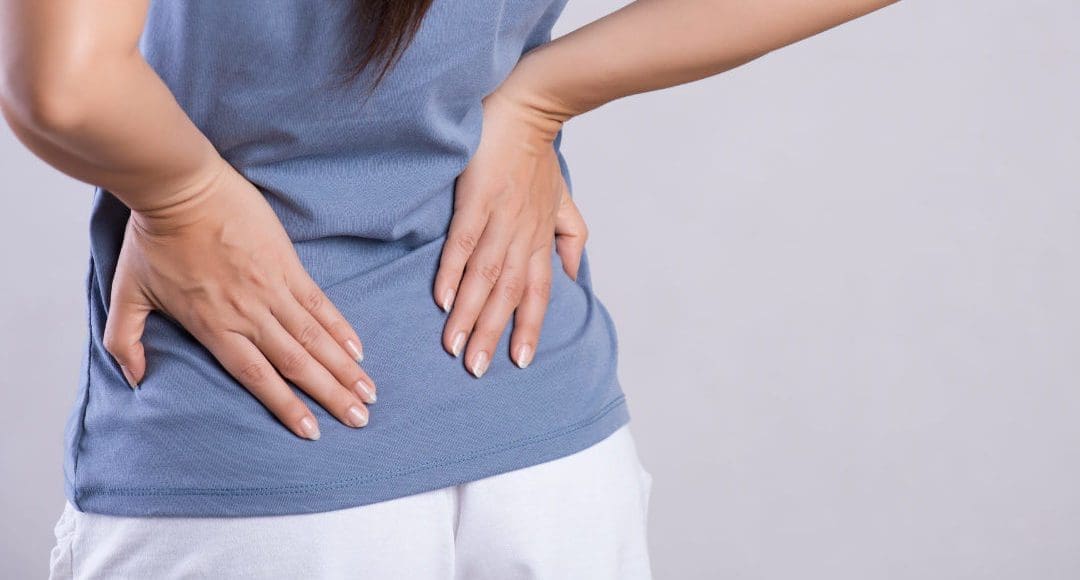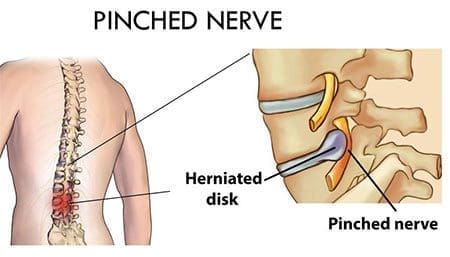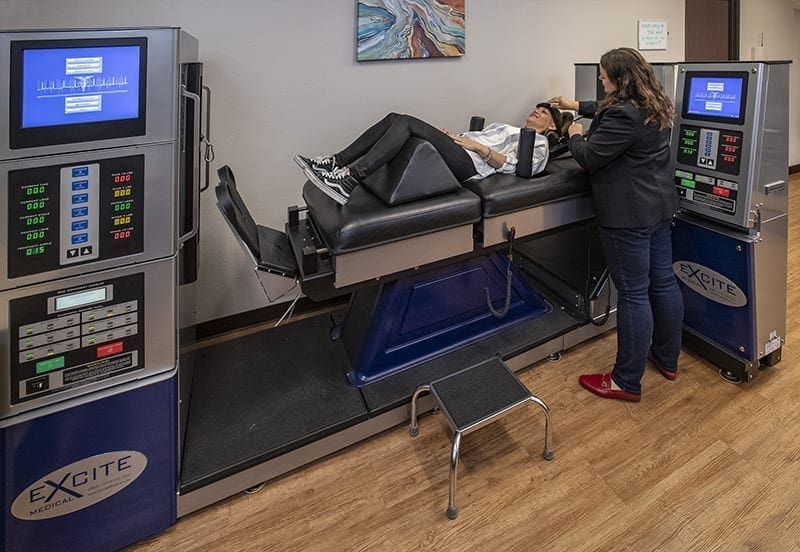Table of Contents
Introduction
The back and spine are bound to the musculoskeletal system, where they work together to keep the entire body moving and upright. The back muscles surround the spine along with the nerve roots, blood vessels, and tissues that help the back to be able to bend, twist, sit, and stand without any injuries or feeling pain. However, as the body ages naturally, so do the back muscles. They are strained and overused from strenuous activities that can injure the back muscles and pressure the nerve roots, causing them to be irritated. Fortunately, some treatments can help alleviate the stress of the nerve roots and relax the back muscles by loosening them up. Today’s article will focus on the lumbar pinched nerves, their symptoms, and how decompression therapy can help alleviate the symptoms of lumbar pinched nerves for many individuals. By referring patients to qualified and skilled providers specializing in spinal decompression therapy. To that end, and when appropriate, we advise our patients to refer to our associated medical providers based on their examination. We find that education is the key to asking valuable questions to our providers. Dr. Alex Jimenez DC provides this information as an educational service only. Disclaimer
Can my insurance cover it? Yes, it may. If you are uncertain, here is the link to all the insurance providers we cover. If you have any questions, please call Dr. Jimenez at 915-850-0900.
What Are Lumbar Pinched Nerves?
Feeling a sharp, sudden pain in your lower back? How about stiff muscles that feel overused after just picking something heavy? How about burning throbbing pain that travels down the legs? You might be suffering from lumbar pinched nerves, which can affect your quality of life. Research studies have mentioned that lumbar pinched nerves are primarily associated with low back pain and are among the most common complaints about many suffering individuals. Low back pain can cause degeneration of the vertebrae disc and constantly irritate the nerve roots spread out on the lumbar area in the spine. The lumbar spinal nerve roots will experience uncomfortable signals like pain, numbness, and tingling sensations that can cause on and off signals that irritate the nerve roots to cause radicular symptoms. Other research studies have found that radicular pain can cause irritating pain alongside the lumbar nerve root without any neurological involvement causing the sensory fibers to be numb. This will cause unwanted sensations to the lower back down the legs.
The Symptoms
Research studies have stated that since radicular pain is one of the many reasons for low back pain, it can affect the nerve roots, depending on the severity. When the nerve roots are being compressed and start by sending on again off again signals, it can range from mild numbing pain that can cause numbing sensations to burning stinging pain that can cause motor dysfunction in the lower back. Some of the other symptoms that are caused by lumbar pinched nerves can include:
- Numbness around the area where the nerve is located
- Sharp burning pain
- Pins and needles sensation
- Muscle weakness in the surrounding area
- A sense that the foot has “fallen asleep”
- The pain is worse when sleeping at night
- Sciatica
Spinal Decompression For Pinched Nerves-Video
Feeling a sharp burning pain radiating from the lower back down to the leg? How about feeling your foot has fallen asleep, and you can’t shake it off? Or have you lost the sensation in your lower back? These are all symptoms of lumbar pinched nerves that are associated with chronic low back pain. The best way to take the pressure off these irritated nerves is spinal decompression. The video explained how there are many techniques that spinal decompression has to offer when dealing with a variety of back issues like herniated discs, sciatica, low back pain, and even pinched nerves in the lumbar area of the spine. Spinal decompression can help relieve the pressure off the nerve roots that are branched out of the spine and relieve the symptoms causing pain. Suppose you want to learn more about decompression and how it can benefit you in alleviating pinched nerves on the lower back? This link will explain what it does for the lumbar area in the spine and provide relief to the back nerve roots.
How Decompression Therapy Can Help Lumbar Pinched Nerves
Since low back pain is associated with lumbar pinched nerves, various treatments can help take the painful symptoms away, and one of these treatments is spinal decompression. Research studies have mentioned that spinal decompression is a type of traction treatment that follows the fundamental goal and principle of relieving pain by using negative pressure. What this negative pressure does is that it causes any herniated or bulging discs to be repositioned and causes an influx of healing substances to come back to the compressed discs and take the pressure off the lumbar nerve roots that are causing the radiating pain. Other research studies have found that decompression therapy can significantly improve lumbar spinal stenosis that also causes lumbar pinched nerves to emit pain by relieving it and bringing physical function back to the legs and back. This will cause significant relief for many suffering individuals suffering from having lumbar pinched nerves.
Conclusion
Overall the lower back has nerves that are spread out and can provide a motor function for the back to move around while keeping the upper body upright. When these nerves are pinched or irritated constantly, they can cause unwanted back issues like low back pain, sciatica, or loss of all sensory and motor functions. When this happens, many individuals won’t have to worry about feeling low back pain or lumbar pinched nerves stopping them from daily activities. Spinal decompression therapy helps the individual gently take the pressure off the irritated nerve roots and causes relief to the lower back and legs. Spinal decompression therapy also allows the beneficial healing nutrients to restore the compressed spinal discs to the spine.
References
Alexander, Christopher E, and Matthew Varacallo. “Lumbosacral Radiculopathy – Statpearls – NCBI Bookshelf.” In: StatPearls [Internet]. Treasure Island (FL), StatPearls Publishing, 12 Feb. 2022, https://www.ncbi.nlm.nih.gov/books/NBK430837/.
Allegri, Massimo, et al. “Mechanisms of Low Back Pain: A Guide for Diagnosis and Therapy.” F1000Research, F1000Research, 28 June 2016, https://www.ncbi.nlm.nih.gov/pmc/articles/PMC4926733/.
Anjarwalla, N K, et al. “The Outcome of Spinal Decompression Surgery 5 Years On.” European Spine Journal : Official Publication of the European Spine Society, the European Spinal Deformity Society, and the European Section of the Cervical Spine Research Society, Springer-Verlag, Nov. 2007, https://www.ncbi.nlm.nih.gov/pmc/articles/PMC2223332/.
Dydyk, Alexander M, et al. “Radicular Back Pain – Statpearls – NCBI Bookshelf.” In: StatPearls [Internet]. Treasure Island (FL), StatPearls Publishing, 2 Nov. 2021, https://www.ncbi.nlm.nih.gov/books/NBK546593/.
Gay, Ralph. “All about Spinal Decompression Therapy.” Spine, Spine-Health, 24 Sept. 2013, https://www.spine-health.com/treatment/chiropractic/all-about-spinal-decompression-therapy.
Disclaimer
Post Disclaimer
Professional Scope of Practice *
The information on this blog site is not intended to replace a one-on-one relationship with a qualified healthcare professional or licensed physician and is not medical advice. We encourage you to make healthcare decisions based on your research and partnership with a qualified healthcare professional.
Blog Information & Scope Discussions
Welcome to El Paso's Premier Wellness and Injury Care Clinic & Wellness Blog, where Dr. Alex Jimenez, DC, FNP-C, a board-certified Family Practice Nurse Practitioner (FNP-BC) and Chiropractor (DC), presents insights on how our team is dedicated to holistic healing and personalized care. Our practice aligns with evidence-based treatment protocols inspired by integrative medicine principles, similar to those found on this site and our family practice-based chiromed.com site, focusing on restoring health naturally for patients of all ages.
Our areas of chiropractic practice include Wellness & Nutrition, Chronic Pain, Personal Injury, Auto Accident Care, Work Injuries, Back Injury, Low Back Pain, Neck Pain, Migraine Headaches, Sports Injuries, Severe Sciatica, Scoliosis, Complex Herniated Discs, Fibromyalgia, Chronic Pain, Complex Injuries, Stress Management, Functional Medicine Treatments, and in-scope care protocols.
Our information scope is limited to chiropractic, musculoskeletal, physical medicine, wellness, contributing etiological viscerosomatic disturbances within clinical presentations, associated somato-visceral reflex clinical dynamics, subluxation complexes, sensitive health issues, and functional medicine articles, topics, and discussions.
We provide and present clinical collaboration with specialists from various disciplines. Each specialist is governed by their professional scope of practice and their jurisdiction of licensure. We use functional health & wellness protocols to treat and support care for the injuries or disorders of the musculoskeletal system.
Our videos, posts, topics, subjects, and insights cover clinical matters and issues that relate to and directly or indirectly support our clinical scope of practice.*
Our office has made a reasonable effort to provide supportive citations and has identified relevant research studies that support our posts. We provide copies of supporting research studies available to regulatory boards and the public upon request.
We understand that we cover matters that require an additional explanation of how they may assist in a particular care plan or treatment protocol; therefore, to discuss the subject matter above further, please feel free to ask Dr. Alex Jimenez, DC, APRN, FNP-BC, or contact us at 915-850-0900.
We are here to help you and your family.
Blessings
Dr. Alex Jimenez DC, MSACP, APRN, FNP-BC*, CCST, IFMCP, CFMP, ATN
email: coach@elpasofunctionalmedicine.com
Licensed as a Doctor of Chiropractic (DC) in Texas & New Mexico*
Texas DC License # TX5807
New Mexico DC License # NM-DC2182
Licensed as a Registered Nurse (RN*) in Texas & Multistate
Texas RN License # 1191402
ANCC FNP-BC: Board Certified Nurse Practitioner*
Compact Status: Multi-State License: Authorized to Practice in 40 States*
Graduate with Honors: ICHS: MSN-FNP (Family Nurse Practitioner Program)
Degree Granted. Master's in Family Practice MSN Diploma (Cum Laude)
Dr. Alex Jimenez, DC, APRN, FNP-BC*, CFMP, IFMCP, ATN, CCST
My Digital Business Card




